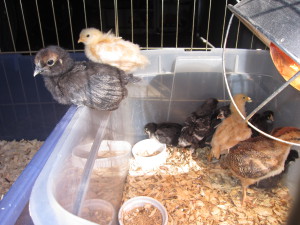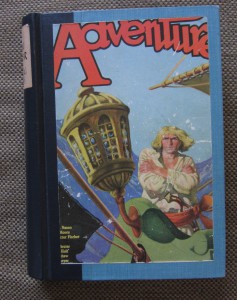Spring!
 Well, almost. You can tell it’s around the corner because of the way our favorite tree is blooming, or the way I hear chirps all day — you see, we have a half dozen baby chicks. In a few months they’ll be full-grown egg layers and will join the rest of the aging flock, but for now they need to be kept under a warming bulb and monitored closely. They have a tendency to knock over their food bowls, or simply to eat all the food quickly. They need a great deal of food for all that energy they need to grow. You can just about see a difference every day between morning and evening.
Well, almost. You can tell it’s around the corner because of the way our favorite tree is blooming, or the way I hear chirps all day — you see, we have a half dozen baby chicks. In a few months they’ll be full-grown egg layers and will join the rest of the aging flock, but for now they need to be kept under a warming bulb and monitored closely. They have a tendency to knock over their food bowls, or simply to eat all the food quickly. They need a great deal of food for all that energy they need to grow. You can just about see a difference every day between morning and evening.
The spring projects loom just around the corner as well, including some expensive window replacement and some painting and the inevitable lawn trimming, which I’ve never much cared for. Maybe if I owned a better weed wacker I could muster more enthusiasm for the chore, but ours constantly stops, and then has to be pull started. It gets tiresome.
 I’m getting some good writing accomplished; I hope soon to learn what my editor thinks of it. And I’ve continued to read from that one-of-a-kind pulp anthology. A few years back I wrote about the different mindset between characters in pulps, and the experience of their writers, versus today. Specifically I typed: “This character from a minor story takes simple, practical actions that most of us wouldn’t know to do, and the author doesn’t make a big deal about it, or the character’s emotions while it’s under way.”
I’m getting some good writing accomplished; I hope soon to learn what my editor thinks of it. And I’ve continued to read from that one-of-a-kind pulp anthology. A few years back I wrote about the different mindset between characters in pulps, and the experience of their writers, versus today. Specifically I typed: “This character from a minor story takes simple, practical actions that most of us wouldn’t know to do, and the author doesn’t make a big deal about it, or the character’s emotions while it’s under way.”
I’m nearly done with this particular anthology and I’ve continued to be surprised. Georges Surdez’ “Dregs of Defeat” turned out NOT to be a French Foreign Legion story, as I’d expected, but a tale about the Franco-Prussain war, replete with historical information unknown to me. The short story that immediately followed, “Orlick the Eagle,” by Kenneth Malcolm Murray, concerned itself with a Polish fighter pilot after World War I, and the Borzoi hound he fosters. The story was good, if not great, but the writer so clearly had knowledge of both Borzoi and planes from the bi-plane era that it crackled with life and interesting details, none of which came at expense of pacing. You knew, reading this, that the author had spent more than a little time piloting, and it made the story a delight.
I have a single story left in the anthology, and I’m going to be hard pressed to return to more modern reading. There’s just such a thrill of discovery in these anthologies. I have more than ten that are mostly if not completely unread by me and I’m tempted to just keep reading — but I do have some books by friends and acquaintances and colleagues that I really need to get to.
0 Comments